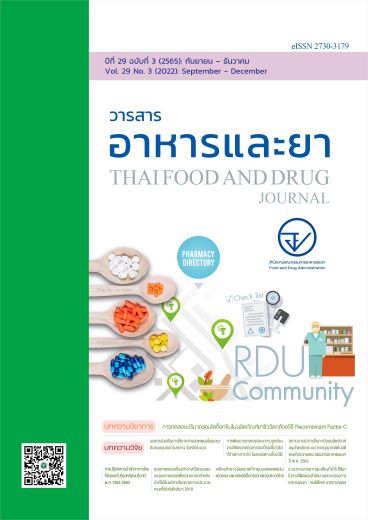ระบบรายงานยากลุ่มเสี่ยงที่นำไปใช้ยาในทางที่ผิดของสำนักงานคณะกรรมการอาหารและยา : กรณีศึกษา ยาทรามาดอล
Main Article Content
บทคัดย่อ
ความสำคัญ: ทรามาดอลเป็นยาในกลุ่มโอปิออยดส์ (Opioids) ที่นำมาใช้เป็นยาบรรเทาอาการปวดระดับปานกลางถึงรุนแรง ซึ่งมีฤทธิ์บรรเทาอาการปวด และฤทธิ์กดการทำงานของระบบประสาท ทำให้เกิดภาวะเคลิ้มสุข จึงพบการนำไปใช้ในทางที่ไม่เหมาะสมในกลุ่มวัยรุ่นไทย สำนักงานคณะกรรมการอาหารและยาซึ่งมีหน้าที่ในการกำกับดูแลและควบคุมการกระจายของยากลุ่มเสี่ยงด้วยระบบรายงาน ตั้งแต่การนำเข้าเภสัชเคมีภัณฑ์และยาสำเร็จรูป การผลิตยาสำเร็จรูปรวมถึงการกระจายของยาสำเร็จรูป อย่างไรก็ตามยังไม่มีการศึกษาที่เกี่ยวกับระบบรายงาน ในการควบคุมการกระจายของยากลุ่มเสี่ยงมากนัก
วัตถุประสงค์: เพื่อวิเคราะห์ข้อมูลการนำเข้าเภสัชเคมีภัณฑ์และยาสำเร็จรูปของยาทรามาดอลที่มีการผลิตภายในประเทศ และประเมินการควบคุมการกระจายยาทรามาดอลจากระบบรายงานของ อย.
วิธีการวิจัย: การวิจัยนี้เป็นการวิจัยเชิงพรรณนา ใช้ประชากรคือข้อมูลปริมาณการนำเข้าเภสัชเคมีภัณฑ์และยาสำเร็จรูปทรามาดอล และข้อมูลการผลิต ระหว่างปี พ.ศ. 2560 – 2561 จากระบบรายงานการนำเข้าฯ ที่ผู้รับอนุญาตนำหรือสั่งยาแผนปัจจุบันเข้ามาในราชอาณาจักร (LPI) และรายงานการผลิตยาที่ผู้ผลิตยาแผนปัจจุบันที่รายงาน อย.้าิจารณาถึงงระบบ ิ เช่น เป็นหญิงร้อยละ 57. จากนั้นคำนวณกลับเพื่อหาปริมาณเภสัชเคมีภัณฑ์ฯ ที่ใช้ในการผลิตยาสำเร็จรูป ด้วยสูตร 1,000,000 mg/ 50 mg = จำนวนแคปซูลหรือยาเม็ดหรือยาน้ำ โดยที่ 1 แคปซูล/เม็ด/ยาน้ำ 1 ml มีปริมาณ API ทรามาดอล 50 mg เพื่อเปรียบเทียบปริมาณนำเข้ากับปริมาณที่ผลิต
ผลการศึกษา: จากข้อมูลรายงานการนำเข้าเภสัชเคมีภัณฑ์ที่นำมาผลิตยาทรามาดอลในฐาน LPI ช่วง 2 ปี พบว่ามีปริมาณนำเข้ารวม 17,360 kg จำแนกเป็นปี พ.ศ. 2560 และ 2561 จำนวน 14,550 และ 2,810 kg ตามลำดับ เมื่อพิจารณาถึงข้อมูลรายงานการขายเภสัชเคมีภัณฑ์ผ่านระบบ FDA Reporter ซึ่งกฎหมายมีผลบังคับใช้ตั้งแต่เดือนพฤษภาคม 2561 พบการนำเข้าวัตถุดิบ (ภ.ค. 3) จำนวน 12,971.02 kg และมีรายงานการขาย 7,633 kg (ร้อยละ 58.85) โดยขายไปยังผู้รับอนุญาตผลิตยาแผนปัจจุบัน และผู้รับอนุญาตขายยาแผนปัจจุบัน ร้อยละ 95.41 และ 4.59 ตามลำดับ อย่างไรก็ตามเมื่อทวนสอบข้อมูลรายงานการขายเภสัชเคมีภัณฑ์ไปยังผู้รับอนุญาตผลิตยากับบัญชีรายชื่อวัตถุดิบที่ใช้ผลิตยา จำนวน 53 รายการ พบว่า มีความสอดคล้องกันร้อยละ 7.55 ส่วนรายงานการผลิตยาประจำปี (ผ.ย. 6) เฉพาะปี พ.ศ. 2560 มีรายงานจำนวนยาที่ผลิตได้ 93,221,290 แคปซูล/เม็ด/ml จำแนกเป็นแคปซูลร้อยละ 55.19 ยาเม็ดร้อยละ 3.85 และยาน้ำร้อยละ 40.96 เมื่อคำนวณปริมาณยาสำเร็จรูปทรามาดอลที่ผลิตได้ย้อนกลับเป็นจำนวนเภสัชเคมีภัณฑ์ที่ใช้ในการผลิต พบมีข้อมูลสอดคล้องกันร้อยละ 92.37 และเมื่อพิจารณาถึงปริมาณยาสำเร็จรูปทรามาดอลที่นำเข้ามาเพื่อจำหน่ายในประเทศในฐาน LPI ในช่วง 2 ปี พบมีการนำเข้าจำนวน 1,251,250.00 แคปซูล แต่เมื่อตรวจสอบความถูกต้องของข้อมูลบัญชีรายชื่อยาที่นำหรือสั่งเข้าฯ น.ย. 4 พบว่าไม่สอดคล้องกับแบบฟอร์มตามกฎหมาย ร้อยละ 100 สำหรับผลประเมินการควบคุมการกระจายยาทรามาดอลจากระบบรายงานพบว่า การตรวจสอบข้อมูลย้อนกลับได้ยาก การผลิตยาสำเร็จรูปมีข้อมูลคลุมเครือไม่อยู่ในรูปแบบที่ใช้วิเคราะห์ได้ทันที เช่น แบบฟอร์มไม่ได้กำหนดไว้ว่าจะต้องลงข้อมูลแบบใด และยังขาดข้อมูลสำคัญในการเชื่อมโยงข้อมูลที่ชี้เฉพาะ เช่น ข้อมูลการผลิตในเอกสารบันทึกการผลิต (Batch Processing Record: BPR) ที่เก็บไว้ ณ สถานที่ผลิตทำให้ไม่มีข้อมูลเชื่อมโยงได้ทั้งระบบ เป็นต้น
สรุป: ระบบรายงานยาทรามาดอลที่มีอยู่สามารถควบคุมการกระจายของการนำเข้าเภสัชเคมีภัณฑ์ในประเทศในเรื่องปริมาณการนำเข้าได้ แต่มีข้อจำกัดที่ไม่ครอบคลุมถึงการขายเภสัชเคมีภัณฑ์ ขาดการเชื่อมโยงข้อมูลสำคัญต่าง ๆ เนื่องจากข้อกำหนดตามกฎหมาย และแบบฟอร์มการนำเข้ายาสำเร็จรูปทรามาดอลไม่ได้กำหนดรูปแบบการรายงานที่ชัดเจน ดังนั้นจึงควรปรับปรุงกฎหมายควบคุมการกระจายยากลุ่มเสี่ยงให้เข้มงวดขึ้น และการปรับปรุงแบบฟอร์มของรายงาน เพิ่มการเชื่อมโยงข้อมูลในการตรวจสอบ ทวนสอบข้อมูลย้อนกลับ และพัฒนาให้เป็นการรายงานผ่านระบบดิจิทัล
Article Details

อนุญาตภายใต้เงื่อนไข Creative Commons Attribution 4.0 International License.
เอกสารอ้างอิง
1.สำนักงานคณะกรรมการอาหารและยา. กองพัฒนาศักยภาพผู้บริโภค. อย. เตือนอย่าใช้ยาทรามาดอลในทางที่ผิด อันตรายถึงชีวิต. นนทบุรี: 2559.
2.พระราชบัญญัติยา พ.ศ. 2510. ราชกิจจานุเบกษา เล่มที่ 104, ตอนที่ 278 ฉบับพิเศษ (ลงวันที่ 8 ตุลาคม 2553).
3.รจิตพรรณ จันทราช. License per Invoice. วารสารอาหารและยา 2557;21(2):77-9.
4.กฎกระทรวงกำหนดหน้าที่ของผู้รับอนุญาตเกี่ยวกับเภสัชเคมีภัณฑ์ที่เป็นสารออกฤทธิ์หรือเภสัชเคมีภัณฑ์กึ่งสำเร็จรูปที่มีส่วนของสารออกฤทธิ์ พ.ศ. 2555. ราชกิจจานุเบกษา กรุงเทพฯ: 2561; 129 ตอนที่ 102: 4-6.
5.กระทรวงสาธารณสุข. ประกาศกระทรวงสาธารณสุข เรื่องกำหนดแบบคำขอ ใบอนุญาต บัญชี รายงาน และคำรับรองในการผลิตยาแผนปัจจุบัน. ราชกิจจานุเบกษา เล่มที่ 133, ตอนพิเศษ 206 ง (ลงวันที่ 14 กันยายน 2559).
6.กฎกระทรวงกำหนดหลักเกณฑ์ วิธีการและเงื่อนไขการผลิตยา พ.ศ. 2546. ราชกิจจานุเบกษา กรุงเทพฯ: 2546; 120 ตอนที่ 19: 1-6.
7.สำนักงานคณะกรรมการอาหารและยา, กองพัฒนาศักยภาพผู้บริโภค. อย. แนะผู้ปกครองดูแลบุตรหลานอย่างใกล้ชิด หวั่นนำยาไปใช้ในทางที่ผิด. นนทบุรี: 2561.
8.สำนักงานคณะกรรมการอาหารและยา, กองพัฒนาศักยภาพผู้บริโภค. บุกร้านขายยา !! จำหน่ายทรามาดอลให้วัยรุ่น ยึดของกลาง กว่า 2 แสนบาท. นนทบุรี: 2561.
9.สำนักงานคณะกรรมการอาหารและยา, กองพัฒนาศักยภาพผู้บริโภค. บุกจับแหล่งผลิตยาปลอมครั้งใหญ่ ย่านปทุมธานี ยึดของกลางมูลค่ากว่า 5 ล้านบาท. นนทบุรี: 2561.
10.กระทรวงสาธารณสุข.ประกาศกระทรวงสาธารณสุข เรื่อง รายการยาที่ต้องรายงานต่อสำนักงานคณะกรรมการอาหารและยา. ราชกิจจานุเบกษา เล่มที่ 132 ตอนพิเศษ 179 ง (ลงวันที่ 4 สิงหาคม 2558).
11.กระทรวงสาธารณสุข. ประกาศกระทรวงสาธารณสุข เรื่อง การกำหนดรายละเอียดเกี่ยวกับหลักเกณฑ์และวิธีการในการผลิตยาแผนปัจจุบัน และแก้ไขเพิ่มเติมหลักเกณฑ์และวิธีการในการผลิตยาแผนปัจจุบัน และแก้ไขเพิ่มเติมหลักเกณฑ์และวิธีการในการผลิตยาแผนโบราณ ตามกฎหมายว่าด้วยยา พ.ศ. 2559. ราชกิจจานุเบกษาเล่มที่ 133, ตอนพิเศษ 206 ง (ลงวันที่ 14 กันยายน 2559).
12.อัมพร พุฒิอังกุล. การพัฒนาฐานข้อมูลการนำเข้าเภสัชเคมีภัณฑ์และเกณฑ์การตรวจจับสัญญาณการนำเข้าเภสัชเคมีภัณฑ์ที่ออกฤทธิ์ที่อาจนำไปใช้ในทางที่ผิด. วารสารอาหารและยา 2556;28(1):84-95.
13.ประพนธ์ อางตระกูล, ณัฏฐิญา ค้าผล, ระพีพรรณ ฉลองสุข. การประเมินความเสี่ยงของระบบรายงานการควบคุมการกระจายยาสเตียรอยด์ในระดับต้นน้ำ: กรณีศึกษายาเดกซาเมทาโซน. [มปพ]; 2560.
14.พัชรีวรรณ ฝังนิล, รวงทิพย์ ตันติปิฏก, รุ่งเพ็ชร สกุลบำรุงศิลป์. การวิเคราะห์และพัฒนายุทธศาสตร์ของระบบการนำเข้ายา. วารสารอาหารและยา 2554;18(3):36-45.
15.กนกวรรณ โสภากิติบูรณ์. การพัฒนาระบบรายงานเพื่อควบคุมวัตถุที่ออกฤทธิ์ต่อจิตและประสาทในประเภท 4 [วิทยานิพนธ์ปริญญาเภสัชศาสตร์มหาบัณฑิต]. นครปฐม: มหาวิทยาลัยศิลปากร; 2558.


